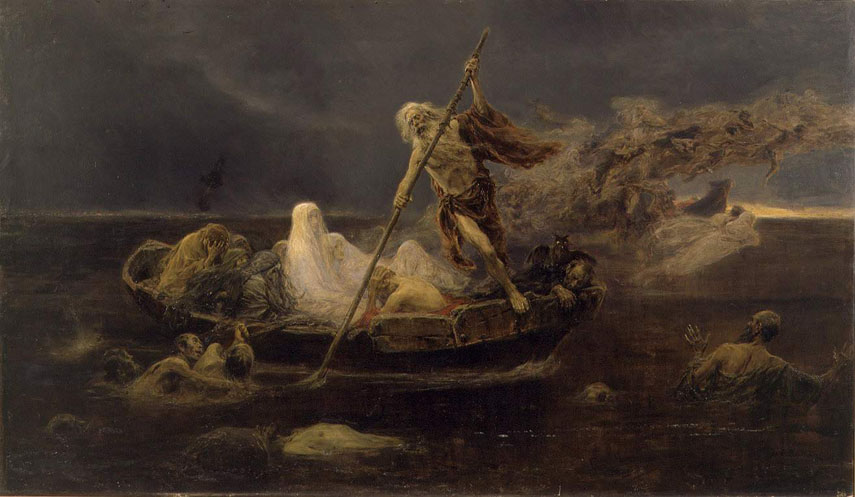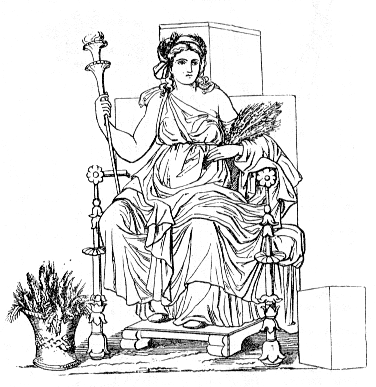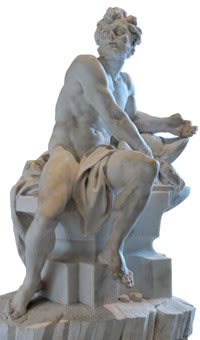★ ignite
(v.t.)
(1) To set on fire 點火; 燃; 使著火。
➜We ignited the dead leaves with a match.
(2) To heat strongly 使灼熱。
★ Achilles’ heel


An Achilles heel is a weakness in spite of overall strength, which can actually or potentially lead to downfall. In Greek mythology, when Achilles was a baby, it was foretold that he would die young. To prevent his death, his mother Thetis took Achilles to the River Styx, which was supposed to offer powers of invulnerability, and dipped his body into the water. But as Thetis held Achilles by the heel, his heel was not washed over by the water of the magical river. Achilles grew up to be a man of war who survived many great battles. But one day, a poisonous arrow shot at him was lodged in his heel, killing him shortly after.
★ River Styx

In Greek mythology, Styx is a deity and a river that formed the boundary between Earth and the Underworld (the domain often called Hades, which also is the name of its ruler).
★ Peleus and Thetis’s wedding

According to classical mythology, the wedding of Thetis and Peleus was celebrated on Mount Pelion, outside the cave of Chiron, and attended by the deities: there they celebrated the marriage with feasting. Apollo played the lyre and the Muses sang, Pindar claimed. At the wedding Chiron gave Peleus an ashen spear that had been polished by Athene and had a blade forged by Hephaestus. Poseidon gave him the immortal horses, Balius and Xanthus. Eris, the goddess of discord, had not been invited, however. In spite, she threw a golden apple into the midst of the goddesses that was to be awarded only "to the fairest." In most interpretations, the award was made during the Judgement of Paris and eventually occasioned the Trojan War.
★ Eris
Eris is the Greek goddess of chaos, strife, and discord. Her name is the equivalent of Latin Discordia, which means "discord". Eris' Greek opposite is Harmonia, whose Latin counterpart is Concordia.
The most famous tale of Eris recounts her initiating the Trojan War by causing the Judgement of Paris. The goddesses Hera, Athena and Aphrodite had been invited along with the rest of Olympus to the forced wedding of Peleus and Thetis, who would become the parents of Achilles, but Eris had been snubbed because of her troublemaking inclinations.
★ Nymph

A nymph in Greek mythology and in Latin mythology is a minor female nature deity typically associated with a particular location or landform. Different from other goddesses, nymphs are generally regarded as divine spirits who animate nature, and are usually depicted as beautiful, young nubile maidens who love to dance and sing; their amorous freedom sets them apart from the restricted and chaste wives and daughters of the Greek polis. They are beloved by many and dwell in mountainous regions and forests by lakes and streams. Although they would never die of old age nor illness, and could give birth to fully immortal children if mated to a god, they themselves were not necessarily immortal, and could be beholden to death in various forms. Other nymphs, always in the shape of young maidens, were part of the retinue of a god.
★ Hades

Hades was the ancient Greek chthonic god of the underworld, which eventually took his name. In Greek mythology, Hades was regarded as the oldest son of Cronus and Rhea, although the last regurgitated by his father. He and his brothers Zeus and Poseidon defeated their father's generation of gods, the Titans, and claimed ruler ship over the cosmos. Hades received the underworld, Zeus the air, and Poseidon the sea, with the solid earth—long the province of Gaia—available to all three concurrently. Hades was often portrayed with his three-headed guard dog Cerberus and, in later mythological authors, associated with the Helm of Darkness and the bident. The Etruscan god Aita and Roman gods Dis Pater and Orcus were eventually taken as equivalent to the Greek Hades and merged as Pluto, a latinization of his euphemistic Greek name Plouton.
★ Cerberus

Cerberus in Greek and Roman mythology, is a multi-headed (usually three-headed) dog, or "hellhound" with a serpent's tail, a mane of snakes. He guards the entrance of the Greek underworld. The most notable difference is the number of his heads: Most sources describe or depict three heads; others show Cerberus with two or even just one; a smaller number of sources show a variable number, sometimes as many as fifty or even a hundred. Each of Cerberus' heads is said to have an appetite only for live meat and thus allow only the spirits of the dead to freely enter the underworld, but allow none to leave. Cerberus was always employed as Hades' loyal watchdog, and guarded the gates that granted access and exit to the underworld.
★ Persephone

In Greek mythology, Persephone also called Kore or Cora, is the daughter of Zeus and the harvest goddess Demeter, and is the queen of the underworld. Persephone was abducted by Hades, who desired a wife. When Persephone was gathering flowers, she was entranced by a narcissus flower planted by Gaia (to lure her to the Underworld as a favor to Hades), and when she picked it the earth suddenly opened up. Hades, appearing in a golden chariot, seduced and carried Persephone into the underworld. When Demeter found out that Zeus had given Hades permission to abduct Persephone and take her as a wife, Demeter became enraged at Zeus and stopped growing harvests for the earth. To soothe her, Zeus sent Hermes to the Underworld to take Persephone back to her mother. However, she ate 6 pomegranate seeds and so she was forever tied to the underworld, since the pomegranate seed was sacred to the underworld. Persephone could then only leave the Underworld when the earth was blooming, or every season except the winter.
★ Demeter

Demeter is the goddess of the harvest, who presided over grains and the fertility of the earth. Demeter's virgin daughter Persephone was abducted to the underworld by Hades. Demeter searched for her ceaselessly, preoccupied with her loss and her grief. The seasons halted; living things ceased their growth, then began to die. Faced with the extinction of all life on earth, Zeus sent his messenger Hermes to the underworld to bring Persephone back. Hades agreed to release her if she had eaten nothing while in his realm; but Persephone had eaten a small number of pomegranate seeds. This bound her to Hades and the underworld for certain months of every year, either the dry Mediterranean summer, when plant life is threatened by drought, or the autumn and winter.
★ rosy-fingered
The dawn goddess Eos was almost always described with rosy fingers or rosy forearms as she opened the gates of heaven for the Sun to rise.
From The Iliad:
Now when Dawn in robe of saffron was hastening from the streams of Oceanus, to bring light to mortals and immortals, Thetis reached the ships with the armor that the god had given her.
— Iliad xix.1
But soon as early Dawn appeared, the rosy-fingered, then gathered the folk about the pyre of glorious Hector.
— Iliad xxiv.776
★ Eos
In Greek mythology, Eos is a Titaness and the goddess of the dawn, who rose each morning from her home at the edge of the Oceanus .Eos had a brother and a sister, Helios, god of the sun, and Selene, goddess of the moon.
★ Achilles’ armor
Achilles’ armor is made by Hephaestus.
★ Hephaestus

Hephaestus is the Greek god of blacksmiths, craftsmen, artisans, sculptors, metals, metallurgy, fire and volcanoes. Hephaestus' Roman equivalent is Vulcan. In Greek mythology, Hephaestus was the son of Zeus and Hera, the king and queen of the gods. In another version, he was Hera's parthenogenous child, rejected by his mother because of his deformity and thrown out of heaven and down to earth. As a smiting god, Hephaestus made all the weapons of the gods in Olympus. He served as the blacksmith of the gods, and was worshipped in the manufacturing and industrial centers of Greece.
★Volcano god
Hephaestus was associated by Greek colonists in southern Italy with the volcano gods Adranus (of Mount Etna) and Vulcanus of the Lipari Islands. The first-century sage Apollonius of Tyana is said to have observed, "There are many other mountains all over the earth that are on fire, and yet we should never be done with it if we assigned to them giants and gods like Hephaestus".


